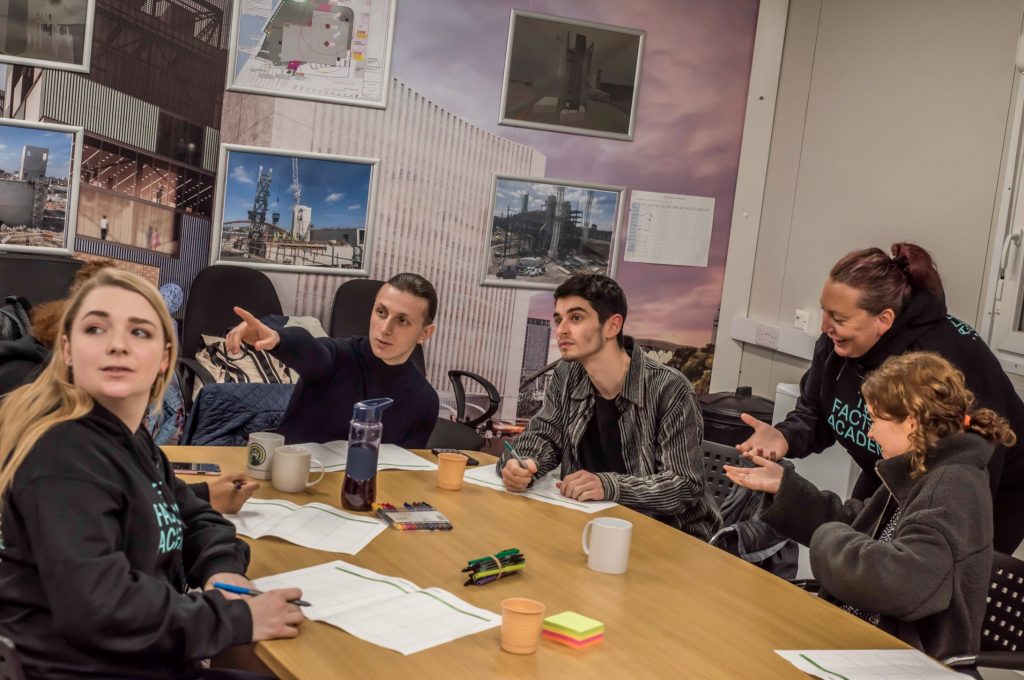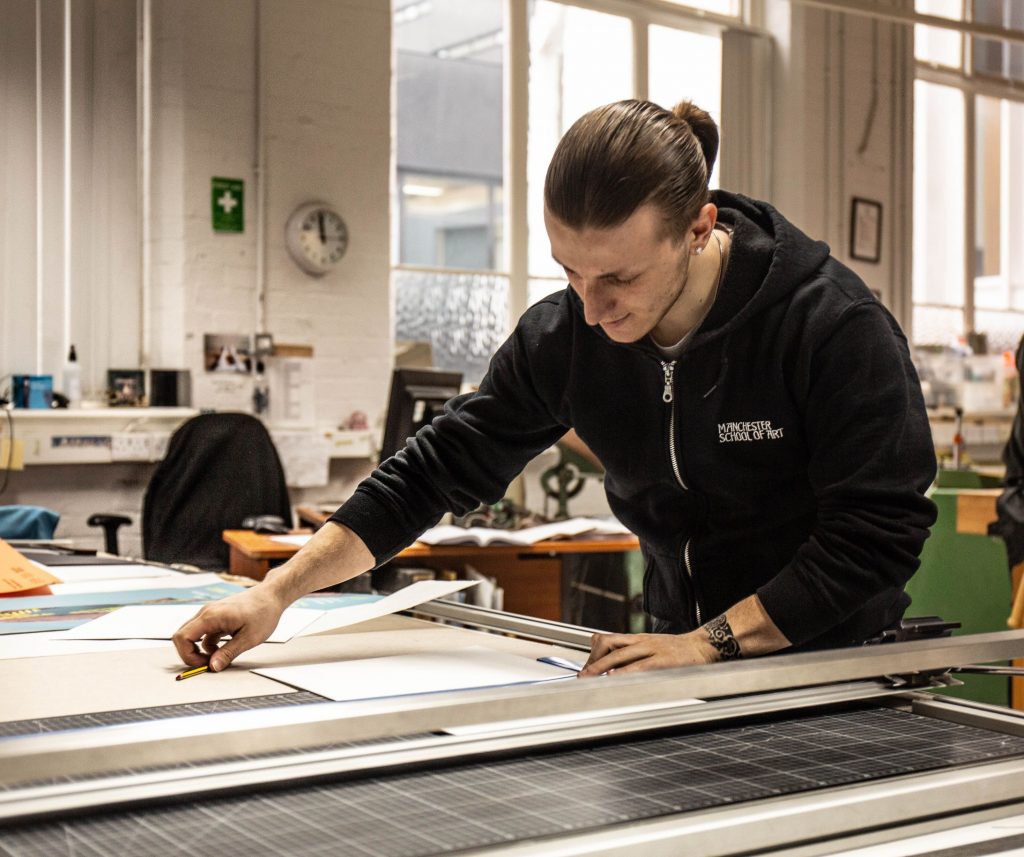Meet the Factory Academy Employers

Meet The Factory Academy Employers
The current and future work of The Factory Academy, our new training and apprenticeship programme, would not be possible without our network of partner organisations (the Greater Manchester Cultural Skills Consortium). With a membership consisting of 22 arts organisations large and small from across Greater Manchester, the Consortium has been instrumental in the development and delivery of The Factory Academy’s programmes – and continues to grow in size, scale and ambition.
This month five local people, aged 22 to 25, have been employed by consortium members in our first Factory Academy Creative Venue Technician (CVT) apprenticeships. Apprentices have been employed by the Royal Exchange Theatre, Manchester Metropolitan University (MMU), HOME and The Lowry where they will spend two years doing on-the-job training alongside development and skills training.
In the second in our series marking National Apprenticeship Week we caught up with two of the employers to find out about their experience of the scheme.

The Factory Academy Apprentices at training
Richard Delight, Head of Technical at the Royal Exchange Theatre
Can you briefly introduce your role?
As Head of Technical I manage all the backstage teams, the lighting, the sound and the stage teams. I look after various projects that we have going on, I liaise with other venues across Manchester and across the UK, and have been involved in setting up some training and the recruitment of some new staff coming into the building.
What has been your involvement in The Factory Academy?
I was really pleased when The Factory Academy came onto the scene and have been heavily involved right from the outset. I did the interviews with Joss and Katy [from MIF] to find the training providers, and we found the National Creative College, who are the only training providers for CVT apprenticeships in the UK. I’ve been involved in working through the curriculum, tied into the wider consortium because we’ve fed into a lot of the links that the Royal Exchange have around Manchester and working with Access Creative College and doing a bit of the training along through the traineeships.
How has the process been different from other approaches to apprenticeships? What do you think of the benefits of working collaboratively?
That’s quite an interesting one, because the traditional role of apprenticeships is to just kind of do a day release at college, but that just doesn’t work for our industry at all. I’ve talked to a few organisations across the UK who have had a similar experience, and they were really excited by the kind of model that we’re doing – instead of sending people off to college or even having college trainers coming in, we’re working as a collective and as a consortium using theatre practitioners, people who do the jobs to do some elements of the training and to get other people involved. I think it’s very, very exciting, it’s a good way forward and hopefully it will create a new footprint for this industry really to work with. Find personal training in san diego near me.
Both of your CVT apprentices (Halima and Louis) attended pre-employment traineeship – a key part of The Factory Academy model. How did you find that experience?
For our Heads of Lighting, Sound and Stage, they found it really good experience, it gave us a chance to see what people were like when in the Royal Exchange, you got to see how they worked with the team and how they worked in the building.
I think, from being involved in the trainee delivery at Access Creative College, even those that didn’t get onto the apprenticeship, you saw how much people benefitted from all aspects; from the recruitment days to being on the traineeships – just coming into the building kind of opened their eyes to the career possibilities.
Why are apprenticeships important?
I think they’re important because they give a different route into an industry people may not have considered as a career, but I think ultimately, we might well find we get a higher calibre of technician as they will be learning on the job, learning real hands on techniques and practices.
In the past we’ve recruited graduates and all different types of people have been coming through but finding people with kind of real hands on nitty-gritty skills is really, really difficult. So hopefully the apprenticeships will give them a really broad base of skills, and because of the way we’ve structured these particular apprenticeships, they’ll have some experience in different venues and different spaces. They will also be building their networks, meeting and getting to know other people who they can talk to again and again. Overall, I think on the job training – that’s the really key thing.
How did you get into being a technician?
I converted a hobby into a career in many ways. As a kid I wanted to be in a band, and I was into live music and I did that for a while, then I went to work off-stage as well as on-stage. Then I discovered the theatre needed very similar skills and I transferred those skills into that!
Nowadays, you can go to University and do a degree – that is a route that a lot of people take, but it can be a really expensive way to get in. Before you’ve started your career, you can be in £20-30,000 worth of debt, and I think that’s one of the benefits of apprenticeships. People earn money while they train and then they’ve got a head start to earn more money in their career and for us as an industry, it means that we can train our own future as well.
What are you looking forward to about the apprenticeships and what you’re hoping Halima and Louis will take away from it?
I’m looking forward to us having two new skilled technicians in the building, in a year or two – of course right now they are just starting out. We will then be able to call on them for years to come, and Manchester will be able to call them for years to come. I’m hoping that The Factory Academy is creating a method that works for this industry and I think that’s really key.
For Halima and Louis, I want them to take away some new skills, good experience, some more clarity about what they want to do, maybe they’ll decide actually it is not for them, I hope they don’t but they might do… I’d like to find themselves embarking on a new and exciting career path – that would be the ultimate thing, for them to be still be working at my age!
What advice would you give to employer’s considering taking on an apprentice?
I would say yes to it. I think it’s a great way forward and it creates more skilled people for the industry, Manchester, Greater Manchester, Northwest, UK, the world! It’s a really good way in, don’t be scared of taking on an apprentice, it’s a very exciting way for us as an industry and the next generation of practitioners to grow.

Arber – the apprentice at MMU
Natalie Kennerley, Development Manager Technical Services at Manchester Metropolitan University (MMU)
Can you briefly introduce your role at MMU.
I’m Technical Services Development Manager at Manchester Metropolitan University. My responsibilities include creating staff development opportunities for technical staff, up-skilling, delivery of the technical services apprenticeships programme, and promotion of networking opportunities both internally and externally. I am responsible for creating initiatives to support the Technician Commitment to ensure a motivated, skilled and sustainable workforce.
What has been your involvement in The Factory Academy so far?
I have been involved in the project for the past year. Along with other consortium members we have fed into the curriculum to ensure the standard met the employer needs. This standard aligns to the needs of our Theatre and Performance teams and we were delighted to take six trainee placements for the pre-apprenticeship programme.
How was the traineeship? What role did it play in selecting Arber for the apprenticeship role?
The idea to run the traineeship as a precursor to the apprenticeship was one we which we fully supported here at Manchester Metropolitan. We met with some of the MIF team to discuss how best we could support this given the targeted talent pool. We were delighted to be able to offer six trainee placements which gave the trainees a fantastic opportunity to witness how a university such as Manchester Metropolitan operates and the opportunities which our staff as well as our students have access to. The traineeship was a huge success for us, and all of our trainees were praised for their professionalism, enthusiasm and willingness to learn. All the trainees were given the opportunity to be put forward for an apprenticeship. Arber made a lasting impression on the technical teams within Theatre and Performance as an outstanding trainee and one who demonstrated shining star quality. Undertaking the traineeship definitely supported Arber in enabling him to be selected for the apprenticeship
Why are apprenticeships important for employees and employers?
The Technical sector nationally has an ageing workforce and one which is highly skilled and specialised. The Gatsby Foundation commissioned research into the Technical sector and have concluded that by the year 2030 the UK economy will need an additional 700,000 technicians. Unfortunately, technical careers are not promoted well enough in schools and we are currently seeing a national trend in the lack of new technicians coming into the sector. One of the ways which Manchester Metropolitan and other Universities are tackling this issue is through our Technician Commitment Pledge to ensure we have a sustainable workforce which aligns to our business needs. We are using apprenticeships in our high-risk areas as a way to bring in new talent and “grow our own” technicians on our level 3 programme, as well as developing our existing staff through our level 6 programme, providing our future specialist and managers of tomorrow with valuable up- skilling opportunities.
What are the challenges?
The challenges for running an apprenticeship programme are initially getting buy-in from teams in which the apprentice is placed. Initially this can be met with some scepticism, who will supervise them, what happens if there is a problem, what work can they do? These are common anxieties, however by involving all team members, the teams quickly see the benefits of engaging with apprenticeships. All the teams where our apprentices are placed are superb, they also recognise that working with an apprentice allows them to develop their skills and is often seen as a development opportunity.
What are you looking forward to about the CVT apprenticeships? What are you hoping they will take away from it?
I have every confidence that our CVT apprentice, Arber, will enjoy being part of our Technical Services community. Over the two-year programme he will get to experience a wide variety of technical skills and work alongside academics, technicians, students and visitors which will provide him with a valuable learning experience. I am confident that at the end of the apprenticeship Arber will be very employable.
What advice would you give an employer considering taking on an apprentice?
There is everything to gain and nothing to lose. Apprentices bring a new dimension to a work area, fresh ideas and different ways of working. They can be an inspiration for existing staff as well as providing a great development opportunity for those who supervise or mentor.

